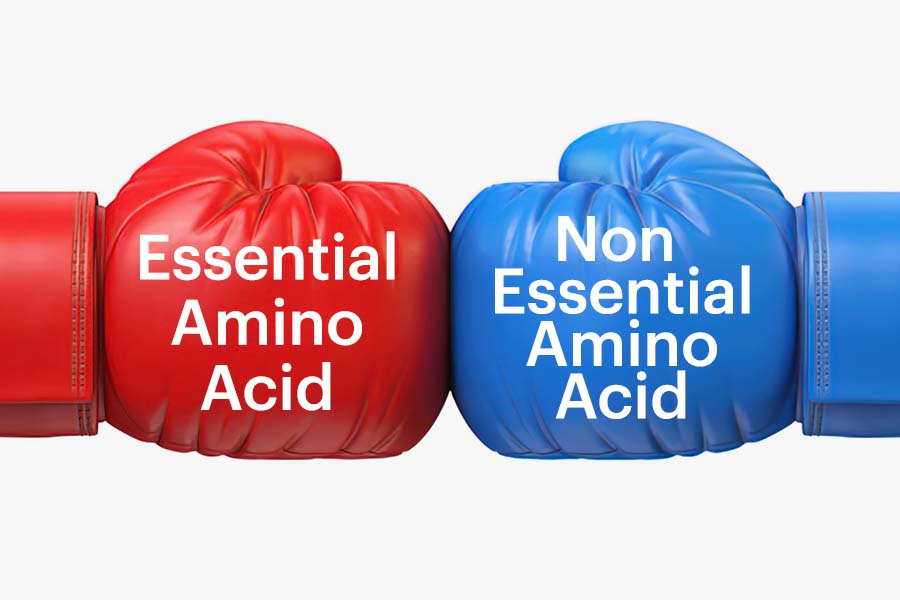Amino acids are the building blocks of proteins and can be classified as essential or nonessential. Our body cannot produce essential amino acids naturally and therefore they need to come from our food. On the other hand, the body can make nonessential amino acids using other compounds and some energy.
Although all amino acids are necessary for nutrition, essential amino acids need special attention and consideration since they provide a wide range of health benefits, such as repairing cells, building muscle tissue, and aiding in hormone production.
In this article, we will break down the differences between essential and nonessential amino acids so that you can better understand their distinct roles in your health and well-being.
Related Article: Foods Containing the Nine Essential Amino Acids That Must Be in Your Diet
Essential Amino Acids & Their Benefits
Essential amino acids are like Legos for your body! They're the building blocks of proteins that play a significant role in keeping us healthy and strong. Without them, you couldn't repair cells, grow muscle tissue, or regulate hormones. Unfortunately, your bodies don't produce essential amino acids, so it's up to us to get enough from our diets or supplements like taking an EAAs + Hydration.
The nine key players are histidine, isoleucine, leucine, lysine, methionine, phenylalanine, threonine, tryptophan, and valine. Best to get those AAs in whatever way possible - they can help you fly like superheroes after all!
Benefits
Essential amino acids are the most important compounds for keeping our bodies healthy. They provide a wide range of benefits, including:
Repairing cells: Essential amino acids are integral in repairing damaged or worn-out cells and tissues, including rebuilding muscle tissue affected by exercise or other activities.
Building muscles: They are needed to build new proteins, which form lean muscle mass and help with strength building and athletic performance.
Hormone production: Certain essential amino acids are precursors for hormones such as serotonin, melatonin, epinephrine, dopamine, and norepinephrine, all necessary for proper bodily functions and mood regulation.
Immunity: Certain essential amino acids are necessary for producing antibodies and other immune system components that help protect us against disease and infection.
Metabolism: Essential amino acids play a vital role in the metabolic process, helping break down food into energy our bodies can use more efficiently.
Mental health: Tryptophan is an essential amino acid found in foods such as turkey, eggs, and dairy products, which helps regulate serotonin levels in the brain and promotes better sleep quality. Lysine also helps balance neurotransmitters responsible for overall mental health and well-being.
Overall, essential amino acids provide many significant benefits for keeping our bodies healthy and functioning correctly. Including them as part of a balanced diet is essential for optimal health.
Non-Essential Amino Acids & Their Benefits
Non-essential amino acids can be produced by your body.These include alanine, arginine, asparagine, aspartic acid, cysteine, and glutamic acid.
Although non-essential amino acids may not be as trendy or glamorous as essential ones, they can still add punch to your diet. While the body can make them internally, consuming them through sources like meat, grains, and beans benefits your overall health.
Non-essential amino acids come with the bonus of increased endurance, enhanced cognitive functioning, and boosted immune system - things we are often looking for in our daily lives. Make sure to give them their due credit by not overlooking them in favor of essential ones.
Benefits
The body can make nonessential amino acids. While these aren't considered "essential" because the body can produce them independently, they still provide many significant benefits.
The benefits of nonessential amino acids include:
Protein Synthesis: Nonessential amino acids play an essential role in protein synthesis, which helps our bodies maintain healthy muscle mass and strength.
Cell Repair: Nonessential amino acids help repair damaged cells, create new ones, and keep them functioning correctly.
Blood Clotting: Certain nonessential amino acids, such as glutamic acid and cysteine, help promote healthy blood clotting.
Hormone Production: Nonessential amino acids are also involved in hormone production, essential for maintaining proper bodily functions and mood regulation.
Energy Production: Nonessential amino acids aid in producing energy by converting proteins, carbohydrates, and fats into usable compounds that the body can use to fuel its activities.
Nonessential amino acids provide many essential benefits for keeping our bodies healthy and functioning correctly. Including them as part of a balanced diet is essential for optimal health.
Food Sources for Both Essential & Nonessential Amino Acids
Essential amino acids must be obtained through diet or supplementation, while nonessential amino acids are produced by our bodies.
When getting essential and non-essential amino acids in your diet, various food sources can provide the necessary nutrients. Essential amino acids come from foods like
- Meat
- Fish
- Dairy Products
- Eggs
- Legumes
If you're vegan or vegetarian, there are still many options for sourcing these vital building blocks; nuts and seeds are excellent plant-based sources of protein and partner exercises that don't require any equipment.
Nonessential amino acids can be obtained through some of the same sources-meat and dairy especially-as well as other foods like
- Whole Grains
- Potatoes
- Cereals
These foods contain carbohydrates that convert into proteins. With ample knowledge about nutrition, anyone can access the benefits of essential and nonessential amino acids through the right balance of dietary choices.
How to Supplement With Essential Amino Acids?
Supplementing with essential amino acids is an effective way to promote muscle growth and recovery. These vital building blocks of proteins help to restore and repair muscle tissue. Supplementing is an excellent option for those seeking to gain lean muscle without expensive equipment.
Calculate your body's daily needs based on your activity level and current weight to supplement with essential amino acids. Once you have that figure, divide the dose by taking it throughout the day and framing meals around the supplements. Lastly, monitor the results, adjust accordingly, and remember to stay properly hydrated when taking amino acid supplements.
Related Article: The Nine Essential Amino Acids: An Overview
FAQs
1. Are protein powders effective in getting the amino acids?
Yes, protein powders can be the perfect addition to a healthy lifestyle. When you don't have time for a full meal, protein powder is ideal for getting the necessary amino acids and keeping your body functioning optimally.
Whether mixed with oatmeal or smoothies, protein powders introduce balance into our diets and give us energy when needed. An added bonus? With all the different types available-whey, soy, vegetarian-friendly, hemp-there's something out there to make everyone happy; your taste-buds have officially been put on notice.
2. What synthesizes nonessential amino acids?
Nonessential amino acids are like the unsung heroes of cellular functions. While they may not get nearly as much attention as the essential amino acids, their presence is still deeply appreciated by our cells - especially hematopoietic lineages, which can manufacture these building blocks of proteins independently. As such, it's clear that these underrated elements lend a huge hand in keeping our cells running smoothly.
3. What causes the amino acid imbalance?
While poor diet and digestion may seem like the obvious culprits for amino-acid imbalances, various gut issues are also visible proof of this. These root problems may include microbiome dysbiosis, an imbalance in the natural ecosystem of microorganisms that inhabit our digestive tract.
Given how delicate this internal environment can be, it is important to take steps toward nurturing a healthy digestive system and ensuring a balanced intake of essential amino acids. Doing so has been proven to support overall well-being and strengthen immune response, not to mention its role in providing you with energy throughout the day.
The Bottom Line
Amino acids are the building blocks of proteins, with two types essential amino acids and nonessential amino acids. The essential ones are not produced by the human body and can only be obtained from food sources. The body produces nonessential amino acids; however, eating a balanced protein-rich diet is essential to maintain good health.
Eating a variety of proteins will provide all the essential and nonessential amino acids needed to build healthy muscles and maintain good immunity. In conclusion, a balanced diet of essential and nonessential amino acids is vital to stay healthy.
Reading List
Article Sources
- Belizario, Jose E., and Joel Faintuch. "Microbiome and Gut Dysbiosis." Experientia Supplementum (2012), vol. 109, 2018, pp. 459-76. PubMed, https://doi.org/10.1007/978-3-319-74932-7_13.
- Durante, William. "The Emerging Role of L-Glutamine in Cardiovascular Health and Disease." Nutrients, vol. 11, no. 9, Sept. 2019, p. 2092. PubMed Central, https://doi.org/10.3390/nu11092092.
- Friedman, Mendel. "Analysis, Nutrition, and Health Benefits of Tryptophan." International Journal of Tryptophan Research: IJTR, vol. 11, Sept. 2018, p. 1178646918802282. PubMed Central, https://doi.org/10.1177/1178646918802282.
- Lakhan, Shaheen E., and Karen F. Vieira. "Nutritional Therapies for Mental Disorders." Nutrition Journal, vol. 7, Jan. 2008, p. 2. PubMed Central, https://doi.org/10.1186/1475-2891-7-2.
- Niemi, Tomi T., et al. "The Effect of N-Acetylcysteine on Blood Coagulation and Platelet Function in Patients Undergoing Open Repair of Abdominal Aortic Aneurysm." Blood Coagulation & Fibrinolysis: An International Journal in Haemostasis and Thrombosis, vol. 17, no. 1, Jan. 2006, pp. 29-34. PubMed, https://doi.org/10.1097/01.mbc.0000195922.26950.89.











